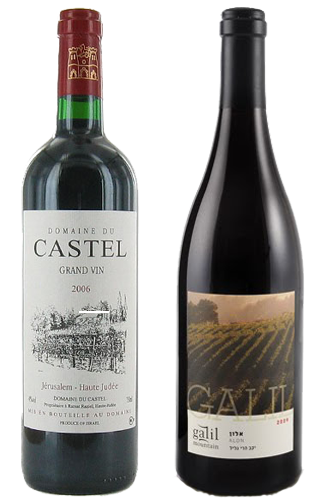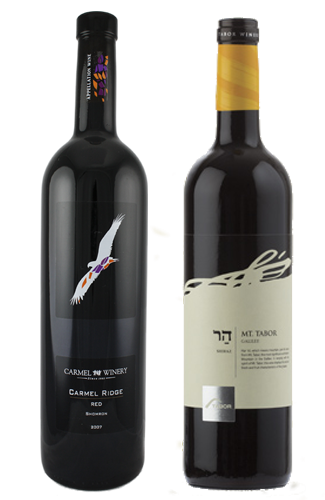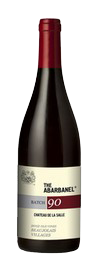There is no other Jewish holiday that celebrates the fruit of the vine quite like Passover. Since the seder literally instructs every attendee to consume at least four glasses of wine, I can’t think of a better holiday for a wine lover! Passover is also the holiday when, more often than not, even folks who don’t normally drink kosher wine feel obligated to have at least one bottle of it at their Passover table; you can blame Jewish guilt, tradition etc. for that. Suffice it to say, it leaves a lot of folks unfamiliar with this area of their wine shop, searching for a few good bottles with no help in sight.
For those who are not familiar with what makes a wine kosher, let me give you the ten-second version. A wine is kosher if it is made solely by religious Jews from the point the grapes are crushed until the wine is placed in the bottle. This law exists because, in biblical times, the rabbis feared the wine they were using for religious ceremonies could have also been used in pagan rituals, and this law was their protection against such an occurrence. Nothing else is different about the wine. (If you’d like to explore what makes a wine kosher in more detail, head on over to Tablet Magazine.)
If kosher wine is basically the same as regular wine, just with extra oversight, then why does it often get a bad rap? Because thanks to mass-producers, for a very long time, most kosher wine has been pretty terrible, and we’re not just talking about Manischewitz.
Unfortunately there is a lot of mass-produced kosher wine out there attempting to pass for quality wine that just isn’t very good. These wines are simply looking to fill the void for the person who feels the need, religious or otherwise, to buy kosher, and that person simply thinks these wines are the best they can do at a price they want to pay. Why is this? Because making kosher wine can be very expensive. The amount of oversight needed to create a quality product that can also receive the kosher label is not cheap, therefore if you’re going to try and make a cheap filler product, you wind up cutting corners and thereby giving kosher wine a bad name.
But, if you’re sick of crappy kosher wine, fear not — relief is on the horizon. Thanks mostly to the recent expansion of wine consumption, there is an increased desire for quality wines from around the world, which has caused many more people to enter the winemaking trade, including those wishing to make great kosher wine.
In order to find you some stellar kosher options for this year’s holiday (or any other day for that matter!), I sat down and tasted some of the best kosher wine currently out there. In approaching my tasting, I only selected red wines to try, as that’s the wine most often drunk during Passover meals. Here are my picks for five great wines to complement your seder, please note they are all non-mevushal:
 Domaine Du Castel – Grand Vin – Domaine Du Castel is one of Israel’s most celebrated wineries, and owner Eli Ben Zanken makes his wine in the classic Bordeaux style. The Grand Vin is dominanted by Cabernet Sauvignon with Merlot, Petit Verdot, Cabernet Franc and Malbec rounding out the blend. This wine needed some time to open up, but once it did, it was beautiful with fresh flavors of cherry and currant. If anyone in your home is a fan of classic Bordeaux, this is their wine.
Domaine Du Castel – Grand Vin – Domaine Du Castel is one of Israel’s most celebrated wineries, and owner Eli Ben Zanken makes his wine in the classic Bordeaux style. The Grand Vin is dominanted by Cabernet Sauvignon with Merlot, Petit Verdot, Cabernet Franc and Malbec rounding out the blend. This wine needed some time to open up, but once it did, it was beautiful with fresh flavors of cherry and currant. If anyone in your home is a fan of classic Bordeaux, this is their wine.
Galil Mountain Winery – Alon – While Alon is also a classic Bordeaux style blend like Domaine Du Castel, there is a geeky twist. Instead of using Cabernet Sauvignon and Merlot as the dominant grapes in the blend, Galil leaves out the Merlot and instead uses Syrah. I loved the choice of using Syrah as the result is a full-bodied wine that has luscious ripe fruit odors and strong tannins that delightfully dry out the mouth. It’s a wine that’s begging to be drunk alongside a brisket.
If you can’t find Alon, I tasted a few other wines by Galil and all were stellar. Although I am only recommending Alon here, you won’t go wrong if you can get your hands on any of the wines made by Galil. The winery is actually a really interesting project between Kibbutz Yiron and the Golan Heights Winery.
 Carmel Winery – Ridge Red – Carmel Winery is Israel’s oldest winery, having been founded by Baron de Rothschild in 1890. Being the oldest winery in the country comes with a lot of history, and while most of it is good, there was a time the winery’s quality was considered to be not up to snuff. From my recent tasting of the winery’s introductory wine, Ridge Red, I can confidently say the winery is yet again producing great wine.
Carmel Winery – Ridge Red – Carmel Winery is Israel’s oldest winery, having been founded by Baron de Rothschild in 1890. Being the oldest winery in the country comes with a lot of history, and while most of it is good, there was a time the winery’s quality was considered to be not up to snuff. From my recent tasting of the winery’s introductory wine, Ridge Red, I can confidently say the winery is yet again producing great wine.
The Ridge Red is an everyday drinking red wine blend, smooth with fresh and bright cherry and plum flavors. The wine is so young and fresh it could easily be the only wine you poured the entire seder if you liked, as it will not only drink well alone, but will also go great with any of the dishes you’ll be serving.
Tabor Winery – Mt. Tabor Merlot – This is a varietally correct Merlot grown in the Galilee. When I say this wine is varietally correct, I mean it has all the characteristics of a classic Merlot. It has a medium body with a lovely fresh red fruit aroma and smooth soft tannins as well as balanced acidity. This is another wine you could pour for the entire seder. The hint of cloves you can smell in the wine would also make it a lovely addition to any charoset.
 The Abarbanel – Chateau De La Salle, Beaujolais Villages – Although our other four great kosher wines come from Israel, this wine comes from France made by the country’s only 100 percent kosher winery, Chateau De La Salle. The Chateau has been growing Gamay grapes since 1850 and, as you know from reading VinePair, we love drinking and serving Gamay. Not only is Gamay a great substitute for people who love Pinot Noir, but it’s such a versatile wine that it can even pair easily with more traditional white wine dishes like gefilte fish and chicken.
The Abarbanel – Chateau De La Salle, Beaujolais Villages – Although our other four great kosher wines come from Israel, this wine comes from France made by the country’s only 100 percent kosher winery, Chateau De La Salle. The Chateau has been growing Gamay grapes since 1850 and, as you know from reading VinePair, we love drinking and serving Gamay. Not only is Gamay a great substitute for people who love Pinot Noir, but it’s such a versatile wine that it can even pair easily with more traditional white wine dishes like gefilte fish and chicken.
The Abarbanel was light and bright with classic Gamay flavors of strawberries and raspberries. If you plan on pouring this wine, we’d suggest serving it with a slight chill.
